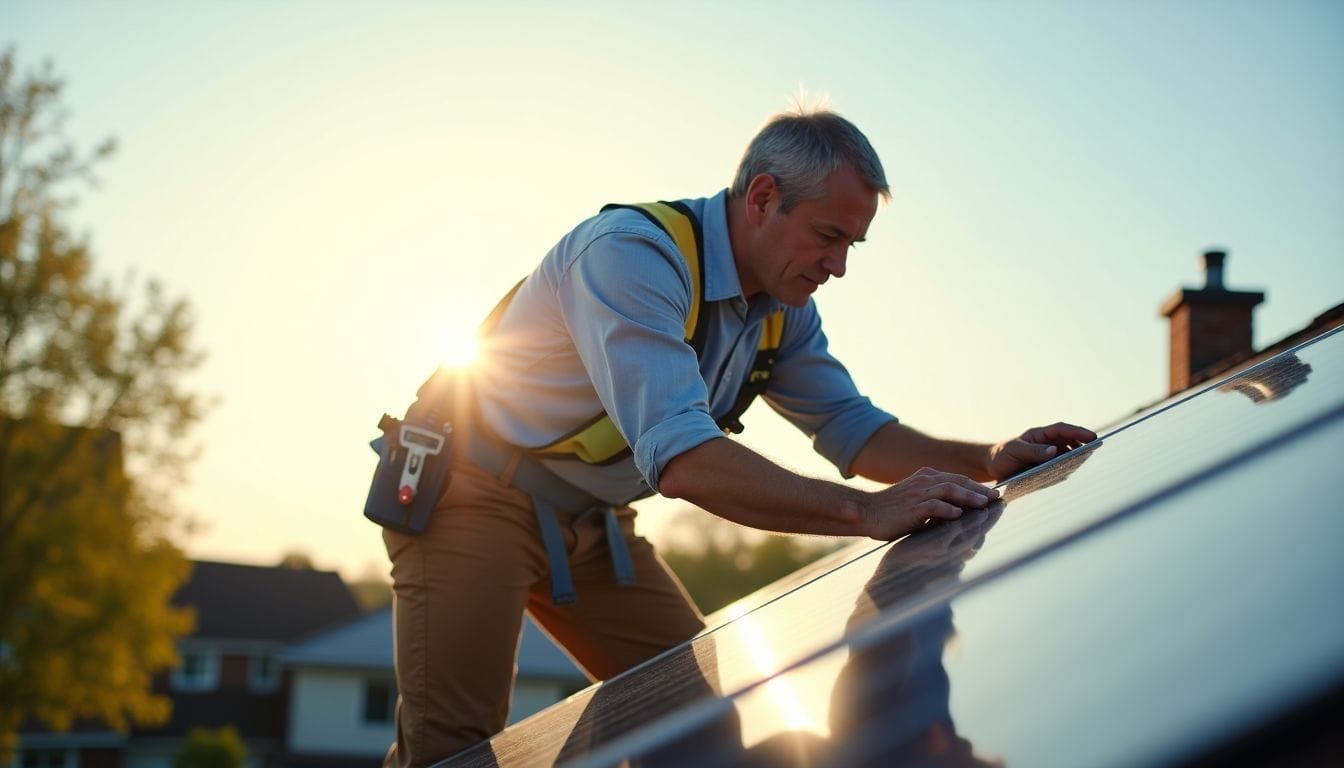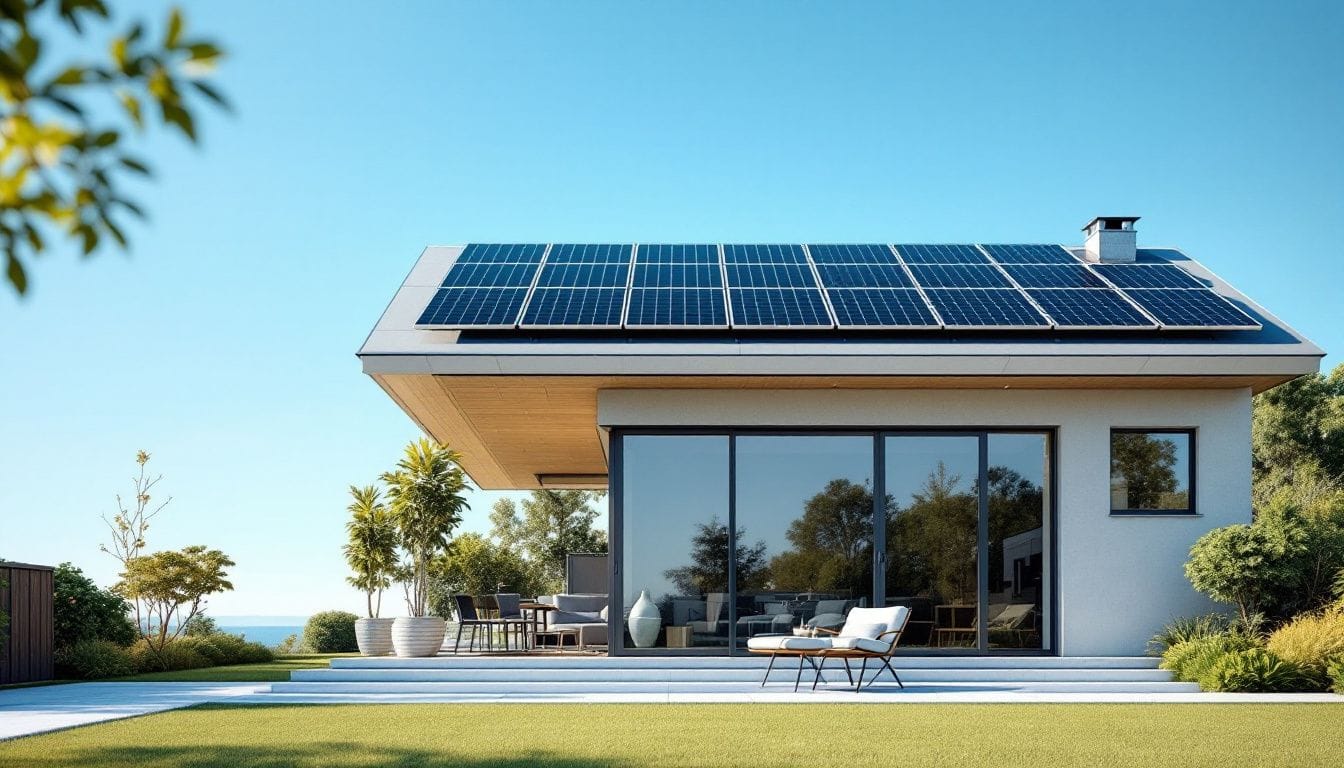Can You Get Solar Panels For A Home Business: The Complete Guide
Are you a home business owner looking to cut costs? Can you get solar panels for a home business? Yes, you can! Many small firms now use solar power to save money on energy bills.
Solar panels can slash your costs by up to 50%. They also help the planet by using clean energy. This guide will show you how to pick the right solar system for your home office. We’ll cover types of panels, costs, and benefits.
Ready to power up your business?
Key Takeaways
- Solar panels can cut home business energy costs by up to 50% and save about £1,200 yearly on bills.
- UK firms can get up to 30% off solar system costs through government tax breaks.
- A 30 kWp solar system can save £5,000 per year on electricity for a business.
- Monocrystalline panels are over 20% efficient and cost £1,000 to £1,500 per kilowatt.
- Battery storage systems, like lithium-ion batteries, can last 10-15 years and help reduce grid reliance.
Can You Use Solar Panels For A Home Business?

Yes, you can use solar panels for a home business. Many firms now opt for this green energy source. It cuts costs and helps the planet. Solar power lets you save about £1,200 each year on energy bills.
This is a big plus for small businesses watching their spending.
Solar panels work well for home offices and shops. They give steady power, even during outages. This keeps your work going without breaks. The UK government offers tax breaks for solar use.
You can get up to 30% off the cost of your system. This makes solar a smart choice for home businesses looking to grow.
Benefits Of Solar Panels For Home Businesses
Solar panels offer big perks for home businesses. They cut costs, boost green cred, and give you more control over your power.
Reduced Energy Costs
Solar panels slash energy bills for home businesses. A 30 kWp system can save £5,000 yearly on electricity costs. This cut in expenses boosts profits and frees up cash for growth.
Firms also earn extra money by selling surplus power back to the grid. The Smart Export Guarantee (SEG) pays for excess energy. Over time, these savings and earnings offset the initial panel costs.
Grants help lower upfront expenses too. The Low Carbon Workspaces grant is one example. It aids businesses in going green. With lower bills and extra income, solar panels pay for themselves in about 14.55 years.
Environmental Sustainability
Solar panels boost a home business’s green credentials. They cut carbon emissions by tapping clean energy from the sun. This helps firms shrink their carbon footprint and support eco-friendly practices.
UK businesses using solar contribute to the national grid’s 4.9% solar share. Installing panels improves a company’s ESG scores too. It shows commitment to sustainable operations and responsible resource use.
Increased Energy Independence
Solar panels boost energy freedom for home businesses. They cut reliance on the grid, giving owners more control. With panels, you can make your own power right on site. This means less worry about blackouts or price hikes.
Panels work even when it’s cloudy. They can cover a big chunk of your energy needs. Some systems meet up to 80% of a business’s power use. This leads to big savings, often over £1,000 each year.
Plus, you’re not at the mercy of energy companies anymore.
Types Of Solar Panels Suitable For Home Businesses
Solar panels come in different types, each with its own pros and cons. Want to know which one fits your home business best? Keep reading to find out!
Monocrystalline Panels
Monocrystalline panels lead the pack in solar tech. These panels boast over 20% efficiency, turning more sunlight into power. They last a long time too – up to 50 years! Most come with 25-year warranties, giving peace of mind to users.
Cost-wise, monocrystalline panels range from £1,000 to £1,500 per kilowatt. While pricier upfront, they save space and money in the long run. You need fewer panels to get the same power as other types.
This makes them great for homes and businesses with limited roof space.
These panels work well in both bright and low-light conditions. They perform better than other types on cloudy days. For UK weather, this means more consistent energy production year-round.
Monocrystalline panels also handle heat well, keeping their efficiency even on hot summer days.
Polycrystalline Panels
Polycrystalline panels offer a cost-effective solar solution for home businesses. These panels sport a unique blue, mosaic-like look due to their crystal structure. They turn sunlight into power using photovoltaic tech.
While slightly less efficient than other types, they’re cheaper to make. This makes them a top choice for big solar projects.
Many firms opt for these panels to cut energy costs. They work well in various climates and can power different business needs. The panels’ lower price point helps companies start using solar sooner.
Their blue hue also adds a modern touch to building exteriors.
How To Choose The Right Solar System For Your Home Business
Picking the right solar system for your home business is key. You’ll need to look at your energy use and storage options. Read on to learn more about making this choice.
Assess Your Energy Needs
To assess your energy needs, start by looking at your power bills. These show how much electricity you use each month. Note when you use the most power. This helps you know when solar panels will be most useful.
Next, list all the devices you use in your home business. Think about computers, printers, and lights. Add up how much power they need. This gives you a clear picture of your energy use.
It also helps you pick the right size solar system.
Don’t forget to plan for growth. If you think your business will expand, you’ll need more power. Choose a solar system that can grow with you. This way, you won’t have to upgrade too soon.
A good solar setup can save you lots of money over time.
Consider Battery Storage Options
Battery storage options boost your solar system’s power. They store extra energy for use at night or on cloudy days. This cuts your reliance on the grid and saves money.
Lithium-ion batteries are top picks for home businesses. They last 10-15 years and work at high efficiency. These batteries can discharge deeply, giving you more usable power. The UK government offers incentives to help with costs.
Good monitoring tools are vital for battery systems. They help you track performance and spot issues early. This ensures your system runs at its best. Choose a battery based on its capacity, power rating, and warranty.
Conclusion
Solar panels offer clear benefits for home businesses. They cut energy costs and boost sustainability. You can choose from monocrystalline or polycrystalline panels. Assess your energy needs to pick the right system.
Take action now to power your business with clean, affordable energy.
FAQs
1. Can I get solar panels for my home business?
Yes! You can invest in solar panels for your home business. It’s a smart way to use renewable energy and save money. Many firms across the UK are switching to solar power.
2. How much do commercial solar panels cost?
The cost of solar panels for businesses can vary. It depends on where your business is and how much power you need. Prices can range from a few thousand to tens of thousands of pounds.
3. What are the benefits of solar panels for a home business?
Solar panels can save you lots on energy bills. They help cut your carbon footprint too. Plus, you might get tax relief from HMRC. It’s a win-win for your wallet and the planet!
4. Do I need special solar panels for a business?
Not really. Both homes and businesses can use standard solar PV panels. The main difference is the number of panels you’ll need. This depends on your power use and roof space.
5. Can I sell extra solar energy my business doesn’t use?
Absolutely! If you make more solar energy than you use, you can sell the excess back to the grid. This can help offset the cost of your solar panel system over time.
6. Is battery storage worth it for a home business?
It can be. Battery storage lets you use solar power when the sun’s not shining. It’s pricey, but it can boost your energy freedom. Think about your needs and budget before you decide.

